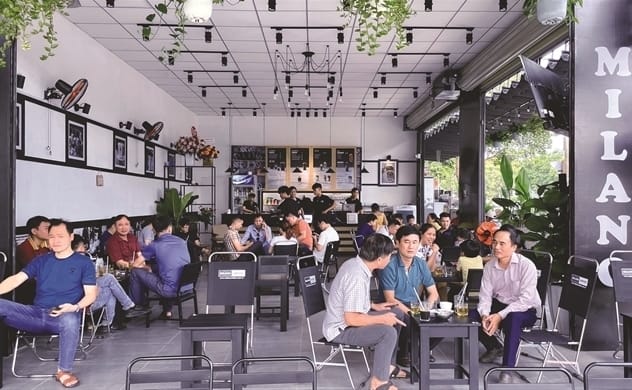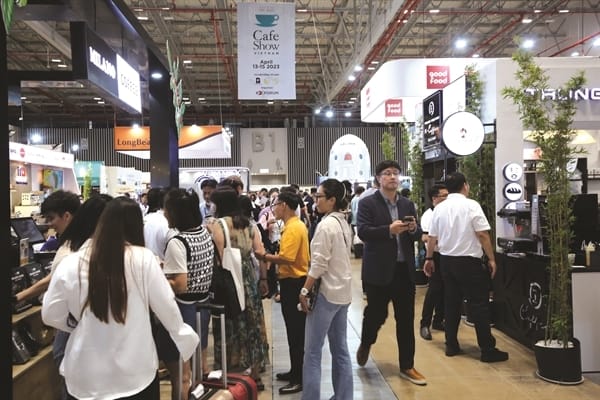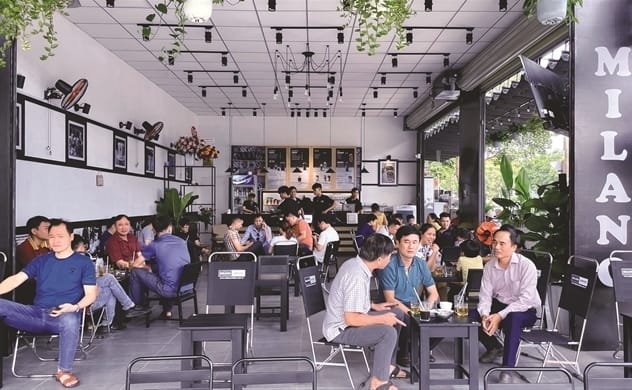
In 2019, Milano decided to raise more capital because it wanted to upgrade the shops, learn professional management, and gain experience in building factories and making more products.
In late 2014, a young man met Le Minh Cuong, who was managing his third coffee shop located on an alley near Nguyen Oanh Street in Go Vap District in Ho Chi Minh City. He spoke about the possibility of franchising Cuong’s Milano coffee brand in Da Lat. At the time, Milano had 50 stores and Cuong had not considered setting up outside Ho Chi Minh City, a hotspot for coffee chains. Finally, he was persuaded by the stranger to do so, under the condition that within three years there must be 12 Milano stores in Da Lat.
The first shop opened on Pham Ngu Lao Street in Da Lat and became a phenomenon at the time, with reports that it was selling more than 300 cups a day. Although that number turned out to be only a rumor, the expansion of Milano in Da Lat ended up surpassing their earlier commitment. The debut and success of the young coffee chain in the nation’s coffee capital stimulated demand for the franchising of the brand. Within four years, Milano’s network grew from 50 stores to more than 1,000 stores by the end of 2018. On average, every year, Milano has opened 250 stores with its partners. Currently, the chain has 1,800 stores extending from the Central to the Southern region.
Cuong was very surprised about the success. In 2011, he decided to open his first Milano coffee store because he just wanted to do something different after a long time of selling roasted coffee beans. At that time, sidewalk cafes with poorly decorated plastic and wooden chairs dominated the streets of Ho Chi Minh City. His Milano restaurant, with a frontage of 5 m2, was decorated in a new style with one area used as a bar for mixing and roasting on-site, and the other area as a place for guests to sit. In the middle of the shop was a high-ceiling wooden cabinet with many large square drawers displaying coffee and tea products.
Why did you say the first Milano shop was the result of “struggling”?
My family has a tradition of roasted coffee. In 2001, after getting married, I decided to start my own business. However, the harsh reality was that although my coffee beans were delicious and rich in flavor, not many people cared about them because the price was high compared to demand.
After three months, I could not sell much coffee. I learned the first lesson that when participating in sales, I have to follow the way the market works first, and then talk about the product’s quality. I changed the product to suit the market. My wife and I borrowed money to do the marketing.
The coffee market at that time was divided into three segments. For the upscale group with large grounds for shops, there was Country House, Mien Dong Thao, Du Mien, and others; the intermediate group had air conditioning and smaller areas; and finally, the general group had shops selling on the sidewalk.
At that time, I had no strategy; every month I offered coffee beans to the high-end group, then the following months I offered to the middle and high-class groups. So I rotated for 10 years. By 2011, my coffee beans were present in most of the famous shops at that time such as the Nhat Nguyet system, MTV music tea room, Star, Meeting Point, and 18 Degrees, among others.
When I had stable resources, I decided to open my Milano cafe. At the time, I thought that selling roasted coffee beans through deals was challenging, let alone selling products directly to consumers. So, after accumulating enough experience in designing and operating the shop with my partners, I decided to open my own shop to satisfy my passion to make coffee in the immediate future.
Did the franchise start there?
In the first three months, the shop sold only enough to survive. After a wave of major newspapers strongly condemned chemically-filled coffee, consumers began to look for healthy products. Seeing that Milano has roasting on site, people liked it very much and the number of customers grew, from a few dozen cups to a peak of more than 200 cups per day. At that shop, I stood selling and mixing, often chatting with customers in my spare time, so they appreciated that. Many people found the model simple and easy to operate, and so they asked me how to do it. At that time, I did not think about franchising, and just gave them instructions about it or put on a piece of paper the materials that they needed to buy, the time for construction, etc. In return, I gave them coffee beans and they used the Milano sign.
The first 10 shops all followed this model and were very successful. At the 11th shop, a regular customer said that because he didn’t have time, he had to ask me to do everything and he would send the fee to me. And we formed a construction department. I remember that shop in Dong Den in Tan Binh district in HCMC. That area has a lot of customers from the Central region. It has a group of customers who are very sparing with compliments, but very fair when evaluating, and Milano was fortunate to be accepted by them. Just like that, two nearby shops were also formed. The good news spread far and wide, and we reached the 50-store mark not long after that. It was the end of 2013 and 2014 when we started going to the provincial market.
 |
Milano once opened a shop at an intersection with a traffic light, but the stop time for vehicles was too short so there were few customers. The shop, which had high operating costs, had to eventually close. Photo: Quy Hoa. |
What is the formula for the Milano franchise?
The second shop we opened on an alley near Phan Van Tri Street in Go Vap district in HCMC. At that time, my wife had spondylolisthesis and could not take care of the shop, so there were not many customers. Later, when she recovered from her illness, she spent more time and sales went up. This was the first message that we sent to our partners: coffee is a service industry, so the owner must take time to care about it; not all the time but during peak times, they must be present.
The second message is viability. Before that, Milano had opened a shop on a street front at an intersection with a traffic light, but because the stop time at the light for vehicles was too short, customers did not pay attention. By the third month, I gave up because the rental cost was too high. Though the shop in the alley did not have many customers for three months, it stayed open because of low costs. It still exists.
All of the Milano shops do not use air conditioning, only fans and nebulizers. We do not prioritize sites that are in areas that are too prime because of high operating costs.
I am quite conservative because I believe that “beauty dies and fades away, but ugly holds its own”. That means a product’s quality has a decisive role, but it takes time to prove this. When businesspeople listen to the market’s opinions, their products will be good and accepted by consumers.
Have you ever been afraid of managing many partners without having any formal training?
Yes, we have made a lot of mistakes, from negotiating the premises and choosing the location to choosing a franchisee partner. The saddest of these is choosing the wrong partner because they do not understand each other, or the franchisee partner is not like-minded, and they only consider the shop as an investment, so the profit is zero.
I feel sorry for them for the loss of time and sorry for Milano for the loss of a new business opportunity. Milano has also been copied, including everything but our order phone number. I was worried because at that time I did not know who to consult or learn from. But in the end, I thought back to it all. Milano didn’t go fast from the beginning, so the problems did not affect the whole system, and we had time to fix and learn.
If the partners do not agree, the agreement will be terminated. Interest is what binds both sides; when the benefit is no longer there, it can’t be forced. So I don’t put too much emphasis on the number of franchise partners as much as the number of partners who understand and believe in me. If one day, the number of partners decreases, then, for me, it is advisable to look for better, more like-minded partners.
Now, everything has changed in the market, and tastes have also changed because the customers are getting younger. Do you believe in keeping up with this change?
I keep telling the operations team that the good fortune from the past 10 years is gone. Good products are the only thing that will help Milano survive the current market fluctuations. Of course, we also have a certain advantage when we have 1,800 partners who can launch new products to retain customers. Milano must always know new consumer trends and use its capacity and experience to select the right trends for its partners and perfect them, bringing them to the market with the most competitive cost and time.
That’s why I haven’t even thought about exporting coffee, even though everything is ready. The domestic market still needs a lot of investment to serve partners in the system.
With over two decades of coffee experience, what makes you happy every day?
Milano is a small company. I have had many positions, but I am a product person by nature. And nothing makes me happier than the feeling that my product is accepted by a large number of users. I still remember an image of an elderly person after the first sip of coffee, continuing to take a second sip as if searching for a taste they had long lost. Or the image of a motorbike taxi driver leading someone to the shop and boasting that “the coffee here tastes great!” That’s my motivation to work tirelessly every day.





